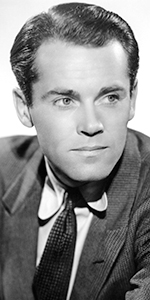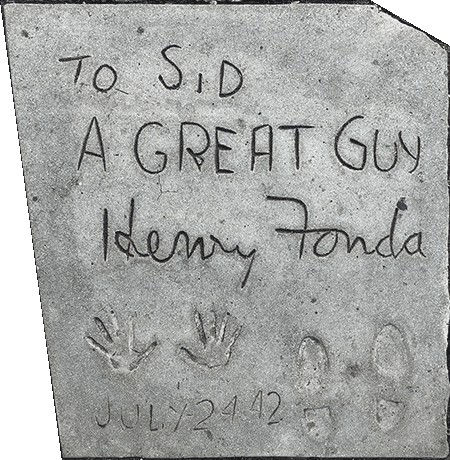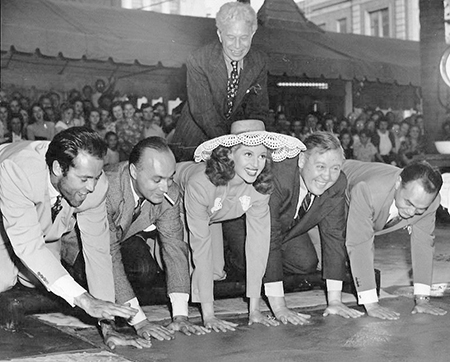 |
 |
 |
 |
 |
| Henry Fonda; Unknown date. |
| |
|
 |
|
 |
| |
 |
| |
| |
|
|
| Henry Fonda with Edward G. Robinson, Charles Laughton, Charles Boyer and Rita Hayworth |
 |
| Forecourt Ceremony held on Friday, July 24, 1942 |
| |
Born: Henry Jaynes Fonda, May 16, 1905, in Grand Island, Nebraska
Age at the time of the ceremony: 37
Died: August 12, 1982, in Los Angeles, California, age 77 |
| |
Henry Fonda is one of the greatest stars in film history. His appeal is both easy to understand and difficult to classify. Quiet and somewhat reserved, Fonda had tremendous presence and could unleash an understated power, which never left a doubt about his characters intentions. Stardom eluded the young actor, but eventually, every director and producer wanted what he could bring to a picture.
Gangly and shy as a lad, young Henry worked for his father, who was a commecial printer. A good athelete in school, he thought of becoming a journalist, a feeling which grew after his father took him to a lynching when he was 14. Fonda was ever after aware of race prejudice, and was almost always on the side of the little guy in his films. He attended the University of Minnesota, but dropped out.
Acting on the advice of Dodie Brando (mother of Marlon), Henry became involved with the Omaha Community Playhouse. Henry was a natural, and became fascinated by all aspects of the theatre. He played the lead in Merton of the Movies, and was such a success, that he headed east in 1928.
Performing in summer stock companies, Fonda formed relationships with Margaret Sullivan (who became his first wife), Joshua Logan, and James Stewart. The two actors shared an apartment in New York as they sought roles on the Broadway stage, but as the Depression opened, the pair had money troubles (who didn't?). Fonda appeared in The Game of Love and Death during the 1929-1930 season, I Loved You Yesterday in late 1932, and New Faces of 1934 in early 1934.
Fonda played the romantic lead in the play The Farmer Takes a Wife in the 1934-1935 season, opposite June Walker. Fonda was asked to play the lead in the film version of Farmer (released in August 1935) opposite Janet Gaynor at Fox; Fonda and Stewart (who had landed at M-G-M), were roommates once again.
Fonda starred in a string of pictures at 20th Century-Fox: a remake of Way Down East (which played the Chinese in October 1935), The Trail of the Lonesome Pine (released in March 1936), and You Only Live Once (released in January 1937). After appearing in That Certain Woman (released in September 1937), co-star Bette Davis picked Fonda to play opposite her in Jezebel (released in March 1938), which really put Fonda on the map, but he was still considered a "up and coming" sort of figure. Now married to Francis Brokaw, Henry began his family, becoming father to Jane Fonda in December 1937, and Peter Fonda in February 1940.
Other films Fonda did as an "up and comer" were Jesse James (which played the Chinese in January 1939), The Story of Alexander Graham Bell (played the Chinese in April 1939), Young Mr. Lincoln (released in June 1939), and Drums Along the Mohawk (played the Chinese in November 1939), which placed Fonda squarley within the stock company of director John Ford.
Fonda was forced to sign a long-term contract at Fox to play the part of Tom Joad in The Grapes of Wrath (which played the Chinese in February 1940). After this amazing turn, Fonda was placed in everything that was a hot property on the Fox lot, like the musical Lillian Russell (played the Chinese in May 1940), or the sequel to Jesse James: The Return of Frank James (played in August 1940), or the Preston Sturges comedy The Lady Eve (released in March 1941), or the rom-com The Male Animal (released in April 1942).
Fonda was one of the five actors from the film Tales of Manhattan to be imprinted on the same day at Grauman's Chinese Theatre. Tales would have its World Premiere at the Chinese two weeks later, in August 1942.
He finished shooting Immortal Sergeant (which played the Chinese in February 1943), and The Ox-Bow Incident (played the Chinese in June 1943), before enlisting in the Navy in November 1942. He was stationed on the destroyer USS Satterlee in the Atlantic, and was later a Lieutenant Junior Grade with the Air Combat Intelligence in the Pacific (the exact same rank held by Doug Roberts in Mister Roberts).
After World War II, Fonda took it slow, working off his Fox contract with My Darling Clemintine (which played the Chinese in October 1946), and Daisy Kenyon (played the Chinese in November 1947). He then hooked up with John Ford's production company, making The Fugitive (released in March 1948), and Fort Apache (released in June 1948).
Enjoying the life of the free agent, Fonda teamed up with old pal Joshua Logan for the stage adaptation of the comic novel about Naval life in the Pacific, Mister Roberts on Broadway from February 1948, to January 1951. Fonda toured the nation with Mister Roberts, then appeared on Broadway in The Canie Mutiny Court-Martial, directed by fellow Tales of Manhattan star Charles Laughton all through 1954.
Fonda returned to the screen in the film of Mister Roberts (released in December 1955), which remains perhaps, Henry Fonda's signature role.
Many films followed: War and Peace (released in August 1956), The Wrong Man (released in January 1957), 12 Angry Men (released in April 1957), Advise and Consent (released in June 1962), The Longest Day (released in October 1962), How the West Was Won (released in February 1963), Spencer's Mountain (released in May 1963), Fail-Safe (released in Otcober 1964), Battle of the Bulge (released in December 1965), Madigan (released in March 1968), Yours, Mine and Ours (released in April 1968), The Boston Strangler (released in October 1968) and Once Upon a Time in the West (released in July 1968).
The 1970s brought a shift in roles: The Cheyanne Social Club (released in June 1970), There Was a Crooked Man (released in December 1970), Sometimes a Great Notion (released in December 1970), Ash Wednesday (released in November 1973), and Il mio nome é Nessuno - My Name Is Nobody (released in the US in July 1974).
Fonda returned to Broadway to play the title role in Clarence Darrow in early 1974, and later in early 1975. He returned to the big screen in Midway (released in June 1976), and Rollercoaster (released in June 1977).
After the Broadway run of First Monday in October during the 1978 season, Fonda retired from doing stage work. Lured back to Hollywood for such films as The Swarm (released in July 1978), and Meteor (released in October 1979), these films weren't great, but they got him out of the house, and the public never tired of seeing Fonda in anything.
Henry Fonda finally co-starred with his daughter Jane in On Golden Pond (released in December 1981). Jane had bought the screen rights to the play in the hopes that her father would play it; the role won him the Oscar for his performance. Too ill to attend the Oscar ceremony, daughter Jane accepted on his behalf.
Fonda died of heart failure at his home, surrounded by his family on August 12, 1982. He was 77 years old. |
|
|
|
|
| |
 |
 |
| Grauman's Chinese Theatre, Hollywood, California. Henry Fonda Forecourt block. Executed by Jean Klossner, Friday, April 24, 1942. 49 x 48 inches overall. |
 |
 |
 |
| Grauman's Chinese Theatre, Hollywood, California. Henry Fonda Forecourt ceremony, Friday, July 24, 1942. Henry Fonda pauses while making his inscription in the cement. |
|
 |
 |
 |
| Grauman's Chinese Theatre, Hollywood, California. Henry Fonda Forecourt ceremony, Friday, July 24, 1942. Sid Grauman presides over the co-stars of the film Tales of Manhattan: Henry Fonda, Charles Boyer, Rita Hayworth, Charles Laughton, and Edward G. Robinson. |
|